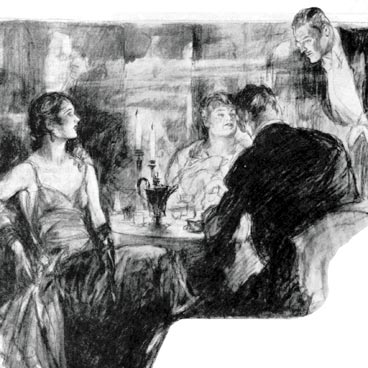The name of Alice Duer Miller has come up several times in recent discussions about Post authors. She produced several exceptional pieces for the Post, including this essay from August 13, 1932, in which she speaks up for American etiquette.
Her comments on Europeans may not be as correct today; the Second World War, the cold war, and today’s steadily shrinking globe has erased many differences between the old and new worlds. But if she is off the mark about Europeans’ insularity, her comments about the rough-but-principled manners of Americans still hold true. What she couldn’t have known was that, over the next seven decades, America’s style and manners—for better and worse—would spread throughout the world.
I Like American Manners
In order to like American manners—and I am talking now of the manners of the man in the street—you must have a real taste for equality. You must not ask to be a sheltered child or an unacknowledged king, but just an equal. In France, any stranger is an inferior—a creature who, having had the basic misfortune of not been born French, is an object for protection, guidance, and a little natural contempt. In England, if you behave properly, you are assumed to be a nobleman [incognito], but in America you are one of ourselves— a mere equal; and if you don’t enjoy equality, you will not be happy…
But if you try to say something like this to high-born foreigners they answer bitterly that they are not treated as equals in the United States, but as idiotic and negligible inferiors. This isn’t true; it is the reaction of those accustomed to being acknowledged superiors. Foreigners sometimes assert that we are not even as democratic as they—that the peeress who dances with her footman at the annual servants’ ball, and the Spanish grandee who can be seen walking a country road with his hand on his drover’s shoulder, are more democratic than anything we can show. They are quite wrong; condescension from an assured position is not democracy. Nor do they understand that in America two types of manner acceptable enough in an aristocracy are absolutely taboo. Here it is worse than a crime to be either subservient or condescending. To be civil here you must convey the idea of equality.
As a test of this, I like to tell the following anecdote: Some years ago, in a large California city — I hesitate to say whether or not the largest in the state — I, fresh from the chilly habits of the Eat, went into a shop to buy, let us say, a yard of ribbon. I had had no special impression of the girl who sold it to me; I was thinking of something else, and finally said quite mechanically: “And now what do I owe you?” Her reply was: “Eighty-five cents, and I simply love your hat.” I have told this story to a great many foreigners, who think it convulsively funny and rather a crack at America. To me, it seems exactly the opposite; it seems to me an example of all that is brightest and best in our national life—a true proof of that friendliness and spirit of equality on which good manners in this country are founded.
But are good manners different in different countries? Is there an essence that underlies them all? And what constitutes good manners? The curse of expressing yourself in print is that sooner or later you must alienate half of your readers by attempting a definition of terms on which, five minutes before, all were entirely agreed.
Is it a proof of good manners that a Frenchman will not permit himself to be fine minutes in a drawing-room with a lady to whom he has not been introduced without demanding an introduction— thus flatteringly suggesting that he cannot tolerate being in the same room with so much beauty and charm unless he has the right to address them? Is it good manners that the English allow a stranger to enter a restaurant or a railway carriage without lifting their eyes? That hard, hostile stare which, in all other countries, greets the newcomer and causes him to trip over his umbrella or walk up his wife’s skirt is always agreeably missing in England. Or is it good manners that, as a European once said to me, if anyone is taken ill in a foreign pension in the night and a doctor is required, it always turns out to be an American who has gone to fetch him? I would answer that all these examples are signs of good manners, and I would then burst boldly into my definition: Good manners are the technic of expressing consideration for the feelings of others.
When the technical aspect is conspicuous, as in the drawing-room, American manners are not usually on so high a level as well-bred European manners, but when pure kindness of heart emerges, as in the foreign pension, then I believe that our manners are the best in the world. [italics added]
Many years ago, before the war, I was traveling from a small Italian town toward France, making many changes of trains. I had had a bad motor accident, and, less injured than the other members of the party, I was making my way back to Paris alone to join my family. My right hand was in a sling, and in my left hand I carried the luggage necessary for the journey. Thus encumbered, I was ill fitted for lighting for a place in crowded corridor trains. I would open the door with difficulty, push it back with my shoulder, and prepare to pass through, protecting my right arm as best I could. But just as I got the door open, waiting crowds of my fellow travelers would rush through, pinning me against the door, taking all the seats, and meeting me at the door of each compartment with the single word “complet.” I sat for hours on a small seat in the aisle, swelling with rage and telling myself that there was no section of my country in which a woman crippled as I was would not have received the tenderest care from the roughest people.
Of course, if I had had a bowing acquaintance with any of these people, the story would have been very different; and a European would say that the story I have just told is not an example of bad manners at all, but of the natural instinct of self-preservation—manners not being concerned with the taking of railway seats from crippled strangers, but with social usages among people who know one another. He would then go on to point out how much better, under this definition, his manners are than ours; and would probably add that it was natural that they should be better, since Europe has been working out the technique of good manners for many hundreds of years, and had, until the other day, a king and court to keep everyone up to the mark. He would say that an aristocrat knows how to be polite as a fireman knows how to be brave—because it is his job. Kings have beautiful manners because everyone suffers so much if they are rude—everyone is so happy if they are gracious.
Well, it’s all true. A well-bred foreigner has a certain gentle assured courtesy that we never attain, or almost never—there was that Boston lady, married to a prominent English statesman, of whom Kind Edward said that she had come over to teach them manners. But in a drawing-room, a foreigner can make the average American feel crude and inept. To save ourselves from this dreadful sense of inferiority, we are apt to say that foreign good manners are false. But they are not false—not falser than any technique is false— not falser than any of the mechanisms that we have built up to keep us from reverting to savagery.
What we might say with justice is that foreign good manners are enormously concerned with getting the owner of them is own way without undue social friction. [italics added]
Ms. Miller’s views of American society aren’t all laudatory. She points out one element missing in American manners: the male influence.
Little boys, in America, are taught manners by their mothers—well taught—to get up when older people come into the room and to offer chairs to old ladies. But by the time they reach college there is a general impression that the American man has something more important to think about than manners. The boys have probably never heard a word on such a subject from their fathers. One of the great emancipations for the American youth entering college is his emancipation from the bondage of having any manners at all. Perhaps, if the standards had not been so entirely feminine, boys at this most masculine age would not react from them so completely. For a few years, until he falls into the hands of his wife, he answers no invitations, pays no visits but those that amuse him, and feels no obligation to limit his dancing to parties to which he has been asked. [Now there’s a dated reference.]
Then he marries and finds himself again submitted to the discipline of a social life quite alien to his ideas of enjoyment, and, like his father, he begins to say that he leaves all that sort of thing to his wife,
This is a situation essentially American. In Europe, men have an equal or a greater share than their women in forming the social manners of their time.
American women have not made a very good job of American society. Let the executive genius of the American man have a chance. Men would undoubtedly make changes. Conversation, I believe, would be more interesting and less chattery. Men would not put forever with the middle-aged wives of their contemporaries and would insist on a few lovely young faces at every party, and thus the age stratifications into which American social life has fallen would be broken down. But, of course, the great advantage would be that men themselves would better pleased and more responsive They would cease to be sulky aliens at their own parties and would become happier and, therefore, better mannered.
Become a Saturday Evening Post member and enjoy unlimited access. Subscribe now



